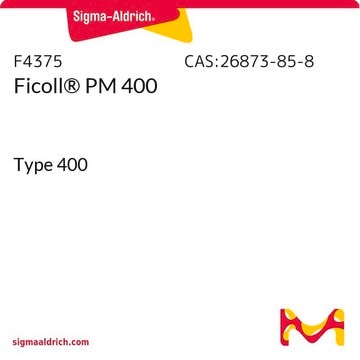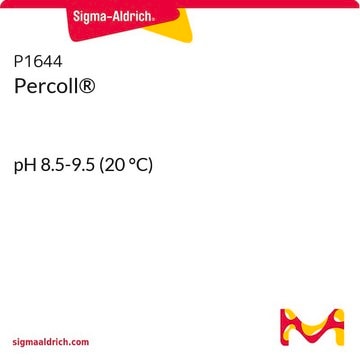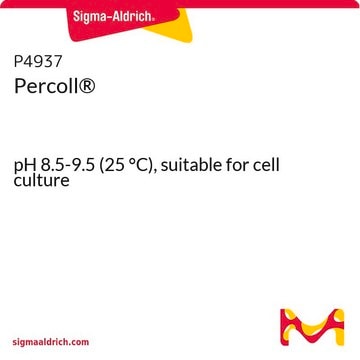F5415
Ficoll® solution
Type 400, 20% in H2O
Synonym(s):
Ready-to-use density gradient media
About This Item
Recommended Products
sterility
0.2 μm filtered
Quality Level
type
Type 400
form
liquid
concentration
20% in H2O
technique(s)
titration: suitable
color
clear colorless
solubility
water: soluble
density
1.055-1.075 g/mL
application(s)
hematology
histology
storage temp.
2-8°C
General description
Application
- Isolation of cord blood mononuclear cells
- Isolation of CD133 negative cells
- Isolation and expansion of circulating endothelial progenitor cells.
Other Notes
Legal Information
Storage Class Code
12 - Non Combustible Liquids
WGK
WGK 3
Flash Point(F)
Not applicable
Flash Point(C)
Not applicable
Choose from one of the most recent versions:
Certificates of Analysis (COA)
Don't see the Right Version?
If you require a particular version, you can look up a specific certificate by the Lot or Batch number.
Already Own This Product?
Find documentation for the products that you have recently purchased in the Document Library.
Customers Also Viewed
Protocols
Hematopoietic stem cell culture protocols for isolation, expansion, and differentiation of CD34+ cells including CFU assays.
Hematopoietic stem cell culture protocols for isolation, expansion, and differentiation of CD34+ cells including CFU assays.
Hematopoietic stem cell culture protocols for isolation, expansion, and differentiation of CD34+ cells including CFU assays.
Hematopoietic stem cell culture protocols for isolation, expansion, and differentiation of CD34+ cells including CFU assays.
Our team of scientists has experience in all areas of research including Life Science, Material Science, Chemical Synthesis, Chromatography, Analytical and many others.
Contact Technical Service















